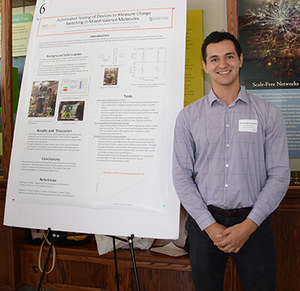Grant Barthelmes, a junior in the Department of Electrical Engineering at the University of Notre Dame, is one of 20 students who participated in the summer 2019 NDnano Undergraduate Research Fellowship (NURF) program. The Woodward Family Endowment for Excellence for NDnano Undergraduate Research has provided the funding for Barthelmes’s fellowship.
 Grant Barthelmes presented his summer project at the July 24 Summer Undergraduate Research Symposium. In today’s high-density integrated circuits, the real limit to progress is power dissipation. Advances in fabrication technology have delivered more than a billion transistors per square centimeter, but they cannot all be fully utilized without melting the chip. This project uses an electron, localized on a “dot” within the molecule, that can be switched to the other dot by an electric field. This can be used to encode information and provide the basis for computation. The position of the electron within the molecule is measured using single-electron transistors, the most sensitive electrometers known.
Grant Barthelmes presented his summer project at the July 24 Summer Undergraduate Research Symposium. In today’s high-density integrated circuits, the real limit to progress is power dissipation. Advances in fabrication technology have delivered more than a billion transistors per square centimeter, but they cannot all be fully utilized without melting the chip. This project uses an electron, localized on a “dot” within the molecule, that can be switched to the other dot by an electric field. This can be used to encode information and provide the basis for computation. The position of the electron within the molecule is measured using single-electron transistors, the most sensitive electrometers known.
Now in its second year of funding NDnano student researchers, the Woodward Family Endowment is helping to expand NDnano’s mission to broaden scientific understanding and engage the next generation of researchers.
Barthelmes’s project involved measurements with single-electron transistors, which are capable of measuring the motion of single electrons within molecules. Determining the position of an electron within a molecule will enable the use of molecules as electronic devices. Barthelmes worked on this cross-college project under the guidance of Greg Snider, professor and chair of the Department of Electrical Engineering, and Emily Tsui, assistant professor in the Department of Chemistry and Biochemistry.
“Grant has worked on automating our measurement set-up, on fabrication techniques to improve the single-electron transistors, and on the experimental measurements conducted at low temperatures,” Snider explained. “It’s been a pleasure working with him. He has made great progress by learning how devices and measurements are made, and how to implement experimental work.”
Barthelmes said he was drawn to this project during the application process because it offered the perfect combination of his diverse interests: chemistry, physics, and new and abstract ways of computing. After three summers as an intern working on radio frequency power amplifiers and systems, he was eager to put his acquired lab, problem solving, and database skills to work in a research setting.
“My job this summer was to automate the test procedure so it can be performed remotely and, thus, much more quickly,” Barthelmes said. “I used a stepper motor, a network of sensors, and a microcontroller to successfully design a system in which the user can interface with a program to control the thermal switches.” Concurrently, he ran tests in the University’s nanofabrication facility and refined the procedure to create the delicate tunnel junctions that the project’s electrometers need to work.
“Through the help of the Woodwards and my faculty and graduate student mentors, I have received a great undergraduate research experience I would not have had otherwise,” Barthelmes said. “The project has exposed me to the research environment and many amazing technologies, and has helped me begin the process of narrowing down my career aspirations.”
Established in 2009, the NURF program provides summer fellowships to undergraduate student researchers. The application process for summer 2020 fellowships will open in January at nano.nd.edu.
NDnano promotes collaborative research in science and engineering to address unsolved scientific and technical questions with an aim to promote the greater good. Advances in imaging and characterization, synthesis, growth, and nanofabrication are enabling breakthroughs in all science and engineering disciplines. NDnano is where Notre Dame faculty, researchers, and students meet to broaden understanding, discuss multidisciplinary research opportunities, and shape future research directions.
To learn more about the center, its members, and its research, please visit nano.nd.edu.